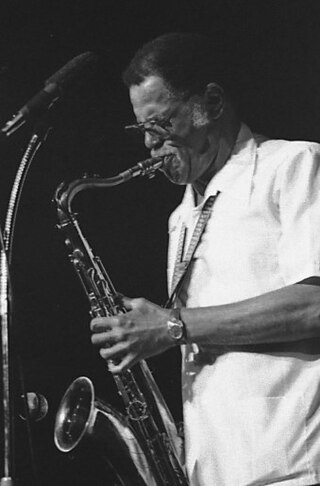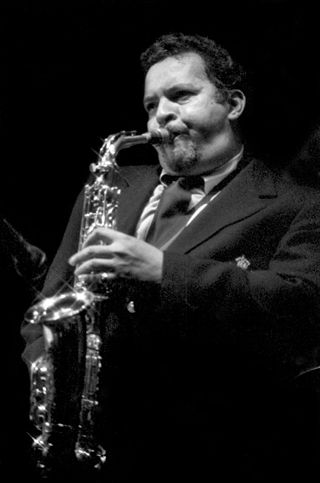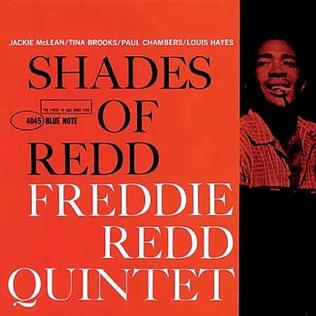
Blue Note Records is an American jazz record label owned by Universal Music Group and operated under Capitol Music Group. Established in 1939 by German-Jewish emigrants Alfred Lion and Max Margulis, it derived its name from the blue notes of jazz and the blues. Originally dedicated to recording traditional jazz and small group swing, the label began to switch its attention to modern jazz around 1947. From there, Blue Note grew to become one of the most prolific, influential and respected jazz labels of the mid-20th century, noted for its role in facilitating the development of hard bop, post-bop and avant-garde jazz, as well as for its iconic modernist art direction.

Dexter Gordon was an American jazz tenor saxophonist, composer, and bandleader. He was among the most influential early bebop musicians, which included other greats such as Charlie Parker, Dizzy Gillespie, and Bud Powell. Gordon's height was 6 feet 6 inches (198 cm), so he was also known as "Long Tall Dexter" and "Sophisticated Giant". His studio and performance career spanned more than 40 years.

John Lenwood "Jackie" McLean was an American jazz alto saxophonist, composer, bandleader, and educator, and is one of the few musicians to be elected to the DownBeat Hall of Fame in the year of their death.

Harold Floyd "Tina" Brooks was an American jazz tenor saxophonist and composer best remembered for his work in the hard bop style.

Edward Rudolph "Butch" Warren Jr. was an American jazz bassist who was active during the 1950s and 1960s.

Freddie Redd was an American hard-bop pianist and composer. He is best known for writing music to accompany The Connection (1959), a play by Jack Gelber. According to Peter Watrous, writing in The New York Times: "Mr. Redd hung out at jam sessions in the 1950s and played with many of the major figures, Sonny Rollins to Art Blakey, and worked regularly with Charles Mingus. When things got tough, he just moved on, living in Guadalajara, Mexico, and in Paris and London."
The Connection may refer to:

Irving Sidney "Duke" Jordan was an American jazz pianist.

The Connection is a 1961 found footage feature film directed by the American experimental filmmaker Shirley Clarke. The film was Clarke's first feature; she had made several short films over the previous decade. Jack Gelber wrote the screenplay, adapting his play of the same name. The film was the subject of significant court cases regarding censorship. It is the first known movie shot in the found footage format and beginning with a found footage title card.
Jack Gelber was an American playwright best known for his 1959 drama The Connection, depicting the life of drug-addicted jazz musicians. The first great success of the Living Theatre, the play was translated into five languages and produced in ten nations. Gelber continued to work and write in New York, where he also taught writing, directing and drama as a professor, chiefly at Brooklyn College, City University of New York, where he created the MFA program in playwriting. In 1999 he received the Edward Albee Last Frontier Playwright Award in recognition of his lifetime of achievements in theatre.

The Music from "The Connection" is an album by the Freddie Redd Quartet, recorded as the soundtrack for Jack Gelber's 1959 play The Connection on February 15, 1960 and released on Blue Note later that year. The quartet features saxophonist Jackie McLean and rhythm section Michael Mattos and Larry Ritchie.

Charles Thomas Potter was an American jazz double bass player, best known for having been a member of Charlie Parker's "classic quintet", with Miles Davis, between 1947 and 1950.

Charles Lawrence Persip, known as Charli Persip and formerly as Charlie Persip, was an American jazz drummer.

Aretha is the debut studio album by American singer-songwriter Aretha Franklin, released on February 27, 1961, by Columbia Records. It features the Ray Bryant Combo. The album is Aretha's first release for Columbia, and is also known under its working title Right Now It's Aretha. Following in the footsteps of her close friend Sam Cooke, Aretha was "discovered" by famed Columbia Records producer John H. Hammond, who on the liner notes of the 1973 edition of "The Great Aretha Franklin: The First 12 Sides" mentions that she was in fact recommended by the composer Curtis Reginald Lewis. With the support of her father, Reverend C.L. Franklin, Aretha traveled to New York City's Columbia Record Studios to record her debut album for the label. Hammond paired Aretha Franklin with Ray Bryant and arranger J. Leslie McFarland, while taking charge of the album's production, which received mixed reviews.

Hub Cap is an album by trumpeter Freddie Hubbard and was released on the Blue Note label in 1961 as BLP 4073 and BST 84073. It features performances by Hubbard, Julian Priester, Jimmy Heath, Cedar Walton, Larry Ridley and Philly Joe Jones.

Music from The Connection is a jazz album by trumpeter Howard McGhee recorded on June 13, 1960, and released on the Felsted label. It features performances by McGhee, Tina Brooks, Freddie Redd, Milt Hinton and Osie Johnson. The album featured music from the off-Broadway play The Connection by Jack Gelber, featuring music composed by Redd. A slightly earlier recording of the same score by the Freddie Redd Quartet with Jackie McLean, The Music From "The Connection", was issued by Blue Note.

Shades of Redd is an album by American pianist Freddie Redd recorded in 1960 and released on the Blue Note label.

Redd's Blues is an album by the American pianist Freddie Redd, recorded in 1961 but not released on the Blue Note label until 1988.

Uhuru Afrika is an album by American jazz pianist Randy Weston recorded in 1960 and originally released on the Roulette label. The album features lyrics and liner notes by the poet Langston Hughes and was banned in South Africa in 1964, at the same time as was Lena Horne's Here's Lena Now!, with copies of the albums being seized in Johannesburg and Cape Town.

The Jazz Messengers were a jazz combo that existed for over thirty-five years beginning in the early 1950s as a collective, and ending when long-time leader and founding drummer Art Blakey died in 1990. Blakey led or co-led the group from the outset. "Art Blakey" and "Jazz Messengers" became synonymous over the years, though Blakey did lead non-Messenger recording sessions and played as a sideman for other groups throughout his career.
"Yes sir, I'm gonna to stay with the youngsters. When these get too old, I'm gonna get some younger ones. Keeps the mind active."

















